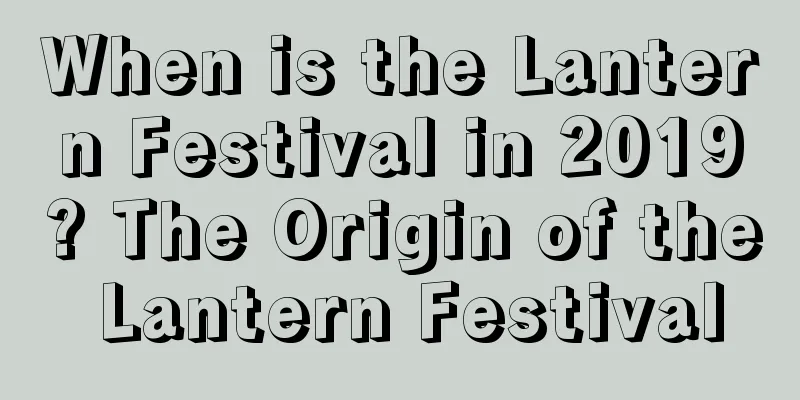When is the Lantern Festival in 2019? The Origin of the Lantern Festival

When is the Lantern Festival in 2019? What is the origin of the Lantern Festival? Is there any legend? Generally speaking, we believe that the Spring Festival is over after the Lantern Festival. The arrival of the first month of the lunar calendar means that the new year has begun. Do you want to know more about the first month of the lunar calendar? Please visit Shuimoxiansheng.com for the special topic of the first month of the lunar calendar in 2019.When is the Lantern Festival in 2019?Lunar calendar: 15th day of the first lunar month in 2019Gregorian calendar: Tuesday, February 19, 2019 Pisces Heavenly Stems and Earthly Branches: Year of Ji Hai, Month of Bing Yin, Day of Ding Hai Auspicious gods to follow: Tiande, Phoenix Day, Bujiang, Liuhe, Mucang, Shengxin, Sixiang, Wufu Evil spirits to avoid: Bazuo, Daozhen, Gouchen, Hekui, Jiesha, Tianbing, Tujin 【Today’s lunar calendar is suitable】 Pray for blessings, get married, migrate, bring in wealth, move into a new house, build a stove, accept a bride, recruit a son-in-law, offer sacrifices, fast and pray, build, seek an heir, lift the groundbreaking ceremony, take up a post, erect pillars, plant, issue a certificate, capture and enroll in school [Today’s taboos in the almanac] Repair graves, bury people, set up beds, cut trees, raise beams, take in livestock, build houses, start drilling, travel meridians, break ground, open businesses The Origin of the Lantern FestivalThe Lantern Festival is a traditional Chinese festival. According to historical records and folk legends, the fifteenth day of the first lunar month was already given importance in the Western Han Dynasty. The activity of Emperor Wu of Han offering sacrifices to "Taiyi" in Ganquan Palace on the first night of the first lunar month was regarded by later generations as a precursor to the worship of gods on the fifteenth day of the first lunar month. The introduction of Buddhist culture in the Eastern Han Dynasty played an important role in the formation of the Lantern Festival customs. Because Emperor Ming of Han promoted Buddhism, Cai Yin happened to have returned from India after seeking Buddhism. Cai Yin said that on the fifteenth day of the first lunar month in the Indian kingdom of Magadha, monks would gather to pay homage to the Buddha's relics, which was an auspicious day to visit the Buddha. In order to promote Buddhism, Emperor Ming of Han ordered that lights be lit in the palace and temples to honor Buddha on the fifteenth night of the first lunar month. Therefore, the custom of lighting lanterns on the fifteenth night of the first lunar month gradually spread in my country with the expansion of the influence of Buddhist culture and the addition of Taoist culture. Since then, this Buddhist ritual festival has gradually expanded into a grand folk festival. The festival has gone through a development process from the palace to the folk, and from the Central Plains to the whole country.Yuanxiao, originally meaning "the night of the Lantern Festival", is a night of the Lantern Festival where the streets and alleys are decorated with lights and colorful lanterns. People admire the lanterns, guess lantern riddles, and eat Lantern Festival dumplings, which brings the celebrations that began on New Year's Eve to another climax and has become a custom passed down from generation to generation. When the Lantern Festival was in its early stages of being a festival, it was only called the fifteenth day of the first lunar month, the middle of the first lunar month, or the full moon. After the Sui Dynasty, it was called Yuan Xi or Yuan Ye. Influenced by Taoism in the early Tang Dynasty, it was also called Shangyuan, and it was occasionally called Yuanxiao in the late Tang Dynasty. But since the Song Dynasty, it has also been called Dengxi. In the Qing Dynasty, it was called the Lantern Festival. With the changes of society and times, the customs and habits of the Lantern Festival have undergone great changes, but it is still a traditional folk festival in our country. |
Recommend
Is the fate of a girl born on June 28th of the lunar calendar in 2022 good or bad?
Is the fate of a girl born on June 28th of the lun...
Is the sixth day of the third lunar month in 2021 an auspicious day for a funeral? How to choose an auspicious day for a funeral?
March is also called Chenyue, Jichun, Peachyue, To...
2022 Year of the Tiger: Top 10 Taboos for the End of Heat
Everyone hopes to have good luck, and the Chushu s...
Is it good for people who have their birthdays on Qingming Festival in 2022? What is the saying about Qingming Festival birthday?
During the Qingming Festival, vitality is strong, ...
Is the fourth day of the first lunar month in the Year of the Rat 2020 an auspicious day for moving house? What good or bad luck does it bring?
From the perspective of Feng Shui: the day of mov...
Mother's Day 2020 - Is it good to move into a new home on April 18? What are the taboos and precautions for moving?
Introduction: It is necessary to choose an auspici...
Is it a good idea to offer sacrifices on the 20th day of the second lunar month in 2018? What are the taboos in sacrifice?
China has a splendid history of about 5,000 years....
How is the twelfth day of the fifth lunar month in 2017? Is it a good idea to move into a new house?
Introduction: Our country is a typical traditional...
The position of the God of Wealth on the 24th day of the third lunar month in 2018
An ancient poem says, "Fireworks are everywh...
Is it good to get a haircut on June 17, the day before the beginning of autumn in 2020? What is the exact time of the beginning of autumn in 2020?
Introduction: Generally, you need to choose an aus...
Is the second day of the fourth lunar month in 2022 an auspicious day for funeral and burial?
The fourth month of the lunar calendar is early su...
Is it a good idea to move house one day after the Spring Equinox in 2020? Weather forecast for the Spring Equinox in 2020!
Introduction: Choosing an auspicious day before mo...
Is the 25th day of the first lunar month in 2019 suitable for a company to open a new store?
A year's plan begins in spring, and almost ev...
What is the date of the Autumnal Equinox in 2020? Is it not suitable to have a haircut on the Autumnal Equinox in 2020?
Introduction: The specific day of the autumnal equ...
There are some tips for raising fish at home, this is the right way to raise fish!
Introduction: There is a saying in Feng Shui that ...









